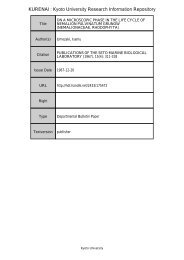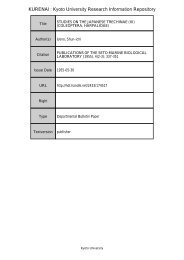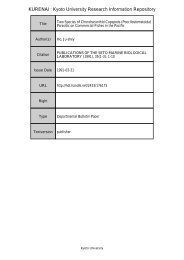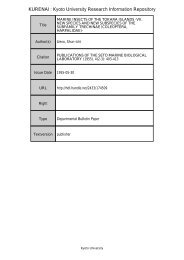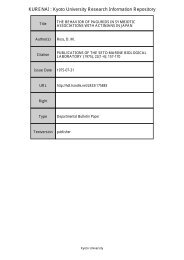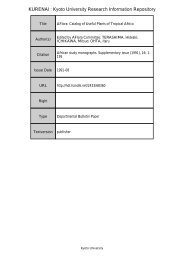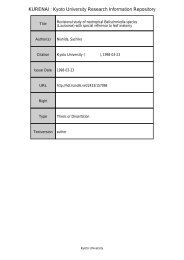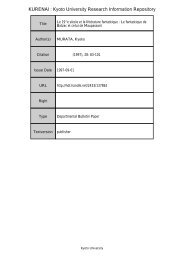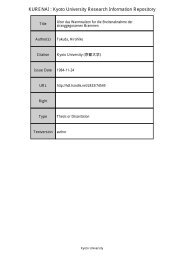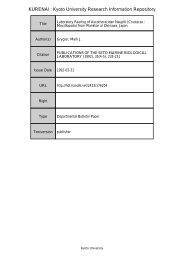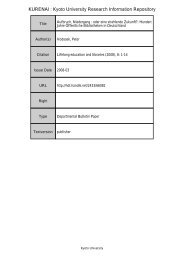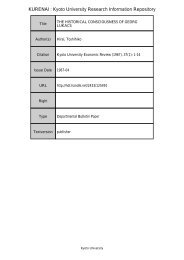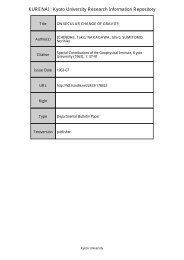Remaindered Life of Citizen-Man, Medium of Democracy
Remaindered Life of Citizen-Man, Medium of Democracy
Remaindered Life of Citizen-Man, Medium of Democracy
Create successful ePaper yourself
Turn your PDF publications into a flip-book with our unique Google optimized e-Paper software.
東 南 アジア 研 究<br />
49 巻 3 号<br />
[Literature] gets the first choice as medium for immortality; the human race at large has learned to<br />
look upon it with uncommon respect and even reverence because, as biography <strong>of</strong> the human spirit,<br />
literature insures the continuance and progress <strong>of</strong> man towards the fruitful but elusive ideal <strong>of</strong><br />
perfection and fulfillment. In no epoch <strong>of</strong> Philippine history is that spirit more aggressive, vital and<br />
vitalizing than today. [<strong>Man</strong>gahas 1973: vii]<br />
The precept <strong>of</strong> an aggressive, vital and vitalizing spirit as the defining content <strong>of</strong> literature and<br />
“real writers” is, I would argue, precisely the metacategory through which the players and<br />
functionaries <strong>of</strong> literature produce their particular “works” or objects. 3) Put differently, that<br />
spirit, which would distinguish writing as “craft” from writing as “art,” is what Philippine<br />
literature under the commonwealth is programmed to produce, shaping the categories <strong>of</strong><br />
attention and care through which writers represent and help to construct the world. We might<br />
say, this precept, broadly shared in the advanced Euro-American world into which Filipinos<br />
were to be benevolently assimilated, marks the reconfiguration <strong>of</strong> a shared sensible order that<br />
the institution <strong>of</strong> a national literature is tasked with carrying out. 4) That redistribution <strong>of</strong> the<br />
sensible (as Jacques Rancière defines primary aesthetics) is geared towards the reconfiguration<br />
<strong>of</strong> Filipinosʼ mode <strong>of</strong> being human along the lines <strong>of</strong> ideal citizenship required by an emerging<br />
capitalist society modeled on the imperial liberal democracy <strong>of</strong> the United States.<br />
Humanization: New Ideals <strong>of</strong> <strong>Life</strong><br />
Today, we witness renewed projects <strong>of</strong> “democratization” carried out through a civilizing<br />
globalizing war against terrorism as well as projects <strong>of</strong> political emancipation through the<br />
broadening <strong>of</strong> the “rule <strong>of</strong> law” <strong>of</strong> liberal democracies, which naturalize the violence <strong>of</strong> dominant<br />
everyday protocols <strong>of</strong> being human embedded in increasingly neoliberal, capitalist ways <strong>of</strong> life.<br />
3) “Vigorous and alive with the spirit <strong>of</strong> man,” as R. Zulueta Da Costa qualifies, in a familiar debate with<br />
Arturo B. Rotor, about the “function” <strong>of</strong> literature and the achievement <strong>of</strong> Philippine writers.<br />
4) John D. Blanco argues that in the nineteenth century, with the liberalization <strong>of</strong> the economy and<br />
reform <strong>of</strong> Spanish political rule in response to the emerging world market, what we call Philippine<br />
literature became a pr<strong>of</strong>ession tasked with the solicitation <strong>of</strong> native consent to colonial rule through<br />
the production <strong>of</strong> a new commodity, “culture,” that would synchronize native consent with the new<br />
political rationality <strong>of</strong> colonial governance. He writes: “The task <strong>of</strong> ʻcultureʼ under colonial modernity<br />
was to organize crowds around the reflection on the new constitution <strong>of</strong> their social relations, which<br />
were informed by the production and ordering <strong>of</strong> new needs and desires...the production and<br />
elaboration <strong>of</strong> a society capable <strong>of</strong> disseminating, reflecting on, and multiplying the implications <strong>of</strong><br />
native consent for colonial rule” [Blanco 2009: 62-63]. While this cultural production <strong>of</strong> native will and<br />
desire through Filipino literature had contradictory and ultimately inimical consequences for the<br />
Spanish modern colonial project, as exemplified in the anti-colonial nationalist works <strong>of</strong> Jose Rizal and<br />
Andres Bonifacio and the Philippine Revolution against Spain in 1898, it is also the case that the<br />
emergence <strong>of</strong> Philippine literature as a technology for the cultural production <strong>of</strong> “the life <strong>of</strong> a<br />
discretely and wholly Filipino nation” during this earlier moment <strong>of</strong> colonial transition becomes, from<br />
the beginning <strong>of</strong> the twentieth century, one <strong>of</strong> the most important institutions undergirding the<br />
imperial project <strong>of</strong> the Philippinesʼ new colonizer, the U. S.<br />
468




